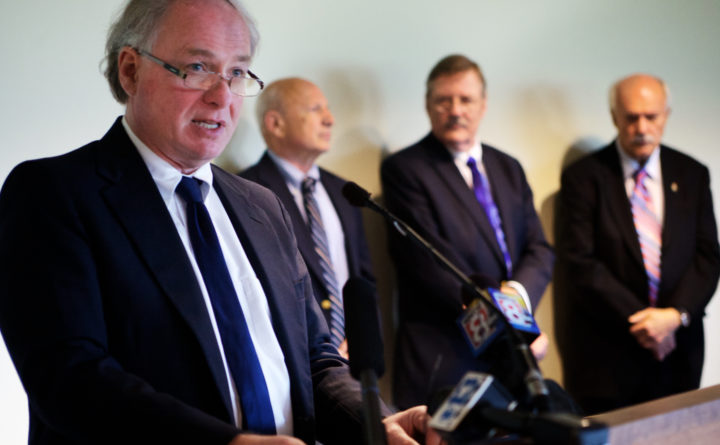
When James Page took the helm of Maine’s university system, student enrollment was declining and the state’s public universities faced sizable, long-term deficits. Seven years later, Page will step down at a time when enrollment has stabilized — and even grown on some campuses — and the system’s long-term deficits have disappeared.
Page, 66, said Tuesday that he plans to retire from his post at the end of the current academic year in 2019. The University of Maine System will launch a national search for his successor and expects to have a new chancellor in place by the summer.
Page took office in March 2012, becoming the first Maine native and university system alumnus to hold the position. His tenure in the position will have been the second longest for a chancellor in the system’s half-century history.
Page spent much of his tenure focused on boosting collaboration among the state’s seven public universities, tailoring and investing in some academic programs to respond to the state’s need for workers in specific fields such as nursing, and trimming the university system’s administrative structure. His tenure was also marked by some cuts to academic programs, particularly at the University of Southern Maine. USM’s elimination of 51 faculty positions and five academic programs in 2014 to stem a $16 million budget gap prompted a number of student and faculty protests.
“We were just wrongly structured and wrongly sized in so many ways,” Page said.
Page’s retirement announcement comes as the University of Maine System Board of Trustees is slated to adopt a set of strategic priorities — such as growing the portion of Maine residents with college degrees and ensuring universities’ academic programs respond to employers’ needs — to guide the 30,000-student university system in the coming years. The board is expected to take up the strategic priorities list at a meeting on Wednesday.
“Certainly during my tenure we moved the institution from one which was highly reactive and was frankly facing enormous fiscal challenges to one where we certainly mitigated them to such a degree that we’re certainly talking about investment,” Page said.
A major part of Page’s effort to change the system’s trajectory was the One University initiative launched in January 2015 to reduce administrative costs, and assign unique missions to each campus and decrease duplication.
Page on Tuesday described the initiative as a cultural shift within a system where individual campuses have traditionally acted largely autonomously. He said there is still more work to do, but the university system has already undertaken many of the major financial changes included in the effort.
The university system cut more than 900 positions from its budget between 2007 and 2015, saving $82 million in salary and benefit costs each year. In 2016, the system closed its central administrative office in downtown Bangor and transferred system office staff to different campuses. And in 2017, the University of Maine at Machias, the system’s smallest university, became a satellite campus of the flagship University of Maine in Orono. The two campuses now share a president and other administration.
“I won’t say we solved all those fiscal challenges because they’re always going to be with us for the foreseeable future to some degree,” Page said.
While system employment has dropped overall, faculty employment has more recently increased, but Page said the additions are strategic. Universities have focused on hiring faculty for programs that will address Maine’s workforce shortage, such as engineering and nursing.
[UMaine system chancellor lays out plan to create ‘mission-differentiated’ campuses]
Before he retires in six months, Page said he will focus on devising a plan to meet the needs of Maine employers and adapt academic programs to provide students with professional work experience.
After retirement, Page said he wants to stay involved in higher education in a consulting role, but he is not planning to take another job.
This article originally appeared on www.bangordailynews.com.







